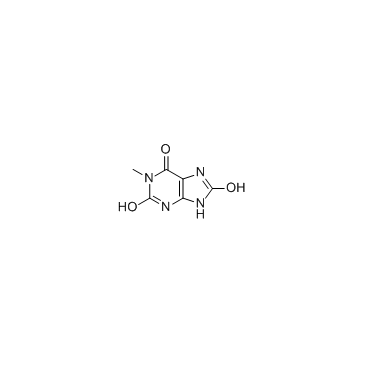Caffeine metabolism differences in acute hepatitis of viral and drug origin.
Y C Bechtel, H Lelouët, M P Brientini, M David-Laroche, J P Miguet, G Paintaud, P R Bechtel
Index: Therapie. 55(5) , 619-27, (2000)
Full Text: HTML
Abstract
The 24-h urinary excretion rate of caffeine metabolites following 200 mg caffeine intake has been proved to be a valuable safe quantitative test of liver function. The pathological mechanism of acute hepatitis of viral and drug origin is different. In both diseases, the patient's caffeine metabolic capacity during the acute and the recovery period was compared. In the acute period, in both diseases, the strongly reduced metabolism of caffeine paralleled the variations of the usual biochemical tests. During the recovery period, in viral hepatitis, caffeine metabolism and biochemical tests returned to the normal values. In drug-induced hepatitis during the recovery period, caffeine metabolism remained severely impaired at a time when biochemical tests were back to the control levels. This discrepancy might be due to the histological or molecular toxic effects of the drug(s), irrespective of cytolysis. After drug-induced hepatitis, a caffeine test might be used to check the total recovery or to choose an adapted dosage of medicines.
Related Compounds
| Structure | Name/CAS No. | Molecular Formula | Articles |
|---|---|---|---|
 |
1-Methyluric acid
CAS:708-79-2 |
C6H6N4O3 |
|
Altered age-related changes in bioenergetic properties and m...
2015-10-01 [Neurobiol. Aging 36 , 2893-903, (2015)] |
|
Pyogranulomatous pneumonia in goats caused by an undescribed...
2015-03-01 [J. Clin. Microbiol. 53(3) , 795-8, (2015)] |
|
Phenotyping of N-acetyltransferase type 2 and xanthine oxida...
2009-04-01 [Eur. J. Clin. Pharmacol. 65(4) , 411-7, (2009)] |
|
Concordance between the deduced acetylation status generated...
2007-02-01 [Clin. Chim. Acta 376(1-2) , 240-3, (2007)] |
|
Phenotyping of N-acetyltransferase type 2 by caffeine from u...
2004-03-01 [Eur. J. Clin. Pharmacol. 60(1) , 17-21, (2004)] |